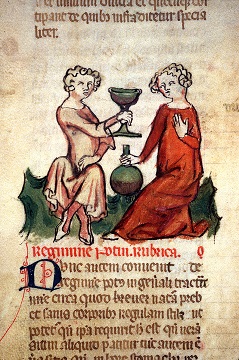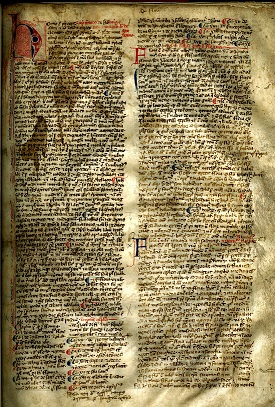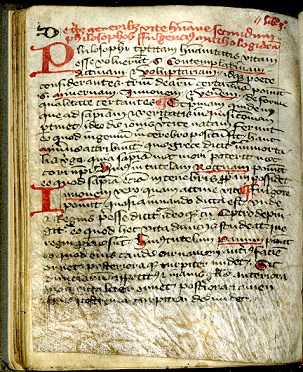Whereas early medieval medical thought and education in Western Europe was primarily the province of the monastic orders, the growth of universities in the 11th and 12th centuries ushered in a new era. During this period medicine was increasingly influenced by academic physicians teaching in a scholastic setting. Two European schools became important early centers of medical teaching, text translation, and advancement: the School of Salerno in Southern Italy, and the University of Montpellier in Southern France. Both schools were well-situated to receive Arabic medical texts due to frequent trade and communication with Constantinople, Northern Africa, and the Mediterranean. And Montpellier was located close to Spain, which had just been returned to Christian control after centuries of Arab rule. As a result of their locations, both schools benefitted from a concentration of translation activity.
 Illuminated page from Regimen sanitatis ad regem Aragonum (14th century)The learned Montpellier medical professor Arnold of Villanova (ca. 1240-1311) is known to have translated numerous texts from Arabic into Latin. But he was also one of the great medical thinkers of the Middle Ages in his own right. He is known for introducing alcohol and medicinal wines into the materia medica and is said to have been the first to distill pure alcohol and to use brandy medicinally. The collection includes his Regimen sanitatis ad regem Aragonum (14th century), which contains one of the earliest treatises on how to make wine.
Illuminated page from Regimen sanitatis ad regem Aragonum (14th century)The learned Montpellier medical professor Arnold of Villanova (ca. 1240-1311) is known to have translated numerous texts from Arabic into Latin. But he was also one of the great medical thinkers of the Middle Ages in his own right. He is known for introducing alcohol and medicinal wines into the materia medica and is said to have been the first to distill pure alcohol and to use brandy medicinally. The collection includes his Regimen sanitatis ad regem Aragonum (14th century), which contains one of the earliest treatises on how to make wine.
 Folio 1r from Tractatus de Flobotomia (Italy, 14th century)Considered by some to be the greatest medieval European physician after Arnold of Villanova, Bernardus de Gordonius (Bernard of Gordon) taught medicine at Montpellier from about 1285 to his death in 1320. The Reynolds-Finley Library holds a manuscript dated to the first half of the 14th century containing four tracts by Bernard of Gordon, Tractatus de flobotomia. Tractatus de urinis. Tractatus de pulsibus. Tractatus de regimine sanitatis. These works focus on blood-letting, urine analysis, the pulse, and the general rules of a healthy life, respectively. Throughout all four tracts, Bernard emphasizes the importance of studying the composition of the blood, which he considered the most important component of the body.
Folio 1r from Tractatus de Flobotomia (Italy, 14th century)Considered by some to be the greatest medieval European physician after Arnold of Villanova, Bernardus de Gordonius (Bernard of Gordon) taught medicine at Montpellier from about 1285 to his death in 1320. The Reynolds-Finley Library holds a manuscript dated to the first half of the 14th century containing four tracts by Bernard of Gordon, Tractatus de flobotomia. Tractatus de urinis. Tractatus de pulsibus. Tractatus de regimine sanitatis. These works focus on blood-letting, urine analysis, the pulse, and the general rules of a healthy life, respectively. Throughout all four tracts, Bernard emphasizes the importance of studying the composition of the blood, which he considered the most important component of the body.
 Folio 17v from Tractatus de Magnete et Operationibus eius (England, 14th century)While medieval scholasticism mainly focused upon learning from and building upon the knowledge of authorities, there were instances of experimental scientific investigation during this period as well. For example, Petrus Peregrinus of Maricourt (fl. 13th century) wrote the first extant treatise on the magnet in 1269 while serving in the crusade of Charles I of Anjou in Lucera, Italy. In this work, Petrus Peregrinus discusses the lodestone, a naturally occurring magnetic iron oxide mineral, which was used in early compasses and in medicine. He also discusses the effects magnets have upon each other with their attraction and repulsion. And he was the first to point out the poles of magnets. Pioneer historian of science George Sarton calls his treatise “one of the greatest monuments of experimental research in the Middle Ages” (Introduction to the History of Science, II, p. 1030-2), and the Reynolds-Finley Library holds a manuscript version, titled Tractatus de Magnete et Operationibus Eius [With other tracts], dated to the 14th century.
Folio 17v from Tractatus de Magnete et Operationibus eius (England, 14th century)While medieval scholasticism mainly focused upon learning from and building upon the knowledge of authorities, there were instances of experimental scientific investigation during this period as well. For example, Petrus Peregrinus of Maricourt (fl. 13th century) wrote the first extant treatise on the magnet in 1269 while serving in the crusade of Charles I of Anjou in Lucera, Italy. In this work, Petrus Peregrinus discusses the lodestone, a naturally occurring magnetic iron oxide mineral, which was used in early compasses and in medicine. He also discusses the effects magnets have upon each other with their attraction and repulsion. And he was the first to point out the poles of magnets. Pioneer historian of science George Sarton calls his treatise “one of the greatest monuments of experimental research in the Middle Ages” (Introduction to the History of Science, II, p. 1030-2), and the Reynolds-Finley Library holds a manuscript version, titled Tractatus de Magnete et Operationibus Eius [With other tracts], dated to the 14th century.
